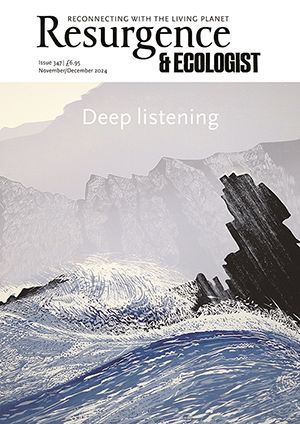I am often asked what the transpersonal is and if I can explain it in a way that is accessible to everyone. The answer is both simple and profound: it encompasses everything, yet at the same time it is deeply personal. The transpersonal perspective proposes that we are spiritual beings on a human journey and emphasises the interconnectedness of all things, where biological, psychological, social and environmental phenomena are all interdependent. American teacher and author Charles Eisenstein puts it beautifully: “Every act is significant and has an effect on the cosmos. We are fundamentally unseparate from each other, from all beings, and from the universe. Every person we encounter and every experience we have mirrors something in ourselves.”
Transpersonal psychotherapy integrates mental, emotional and spiritual growth and delves into deeper levels of consciousness. It believes that everyone possesses innate potential, regardless of their upbringing and life circumstances. Each difficulty we face is seen as an opportunity for our soul to develop new qualities, paving the way for greater integration. If we are open to it, our pain can be purposeful. It is here to teach us and provide the wisdom we need to share our unique gifts with the world.
Theoretical foundations
The Swiss psychiatrist and psychotherapist Carl Jung is recognised as the first person to use the term ‘transpersonal’ and believed that our potential lies in our lower unconscious, where we can access symbols and archetypes. He saw the imaginary realm as a distinct dimension accessed through engaging with archetypes, visualisations, meditations, and artistic expressions like drawing and painting. Dreams are also vital pathways to this imaginal world, as they are where our imagination unfolds. A transpersonal therapist will often use these tools as gateways to a client’s psyche.
We all harbour both light and darkness. Integrating our shadow aspects – the parts of ourselves that we repress or find hard to accept – is fundamental to personal growth. It’s easy to extend love to our positive qualities, but recognising and embracing our less favourable parts allows us to heal them and accept them in others too.
Inner conflicts, outer crises
Many global wars and crises stem from these inner conflicts, manifesting collectively as projections of unresolved energy onto groups, peoples or particular situations. Just as within families, entire groups of people have been scapegoated throughout history. Transpersonal psychotherapists Barbara Somers and Ian Gordon-Brown explain: “We project our locked energies, unresolved conflicts, unsatisfied drives to wholeness on the environment. What we see there is our own condition mirrored, and individuation is the process of internalising these projections.”
Our world is at a critical juncture. The way we live has a profound impact on our environment, yet we behave as if our actions have no consequences. If we continue our current habits – emitting excessive greenhouse gases, burning fossil fuels for energy, deforestation and mindless consumption – climate change will lead to irreversible consequences. Our ecological crisis is also a spiritual crisis, affecting all aspects of humanity. Economic inequality and wealth disparities, political instability and conflict exacerbate these problems, leading to social unrest and human rights violations. We must recognise that we are all complicit. You cannot change one aspect without altering the entire system.
My personal journey
My journey to becoming a transpersonal psychotherapist marked this profound shift from living unconsciously to awakening, with effects rippling through every area of my life. I turned to the transpersonal shortly after turning 40. From the outside, it looked like I had it together: I was running a successful media agency, earning a decent salary, and in a long-term relationship. Then everything collapsed due to back problems. I was rushed to the hospital for emergency surgery on a bulging slipped disc, which could have left me paralysed had I waited any longer. In a short time my life fell apart. I had to step down from my job, my relationship ended, and I had to sell the home I shared with my partner. Stripped of these external markers, I found myself on my sister’s couch, feeling very sorry for myself. I have always been relationship-oriented and career-driven, and to be in this predicament at an age when everything was meant to be coming together was extremely anxiety-provoking.
In reality my back problems were a physical manifestation of deeper, unresolved burdens I hadn’t faced. Despite being grateful for my job, I had felt overloaded and creatively starved. I hadn’t fully processed my mother’s early death and our father’s absence, and I knew deep down that my relationship wasn’t really going anywhere. Initially I felt completely at a loss. Where does one begin overhauling one’s entire life? As the weeks passed and I regained my mobility, my incredible sister recommended that I sign up for a transpersonal psychotherapy foundation course she had found transformative. Though I had no interest in training to be a psychotherapist, I had nothing to lose. I was on a journey to discover who I really was. When I started the course, I felt like I was coming home.
I soon realised I had been living a life that didn’t reflect my values, which is why everything had fallen apart. The Dalai Lama says: “True peace with oneself and with the world around us can only be achieved through the development of mental peace.” As I connected with my inner voice and slowed down, I began to appreciate life again – simple pleasures like a beautiful walk or a meaningful conversation with a friend. I started keeping a gratitude journal, which I still maintain today. I asked myself what I truly wanted to do. Being creative and project-driven, yet passionate about helping people, I began volunteering for a mental health charity. Soon I started earning a living again by producing films for them and running PR campaigns for wellness brands.
I began to feel alive and grounded. Subsequently I met my wonderful husband and continued my training as a transpersonal psychotherapist, which transitioned from a side hobby into a vocation. If I could turn my life around, perhaps I could help others do the same. Now I combine a part-time psychotherapy practice with a career in wellness publishing, which I love. Like everyone, I’m still a work in progress, but hopefully just a more conscious one. Jung said that those inner situations left out of consciousness happen outside of us, and we call them fate. As a transpersonal psychotherapist, I aim to help clients shift from a personal to a spiritual perspective, viewing challenges as opportunities for growth.
Collective consciousness and actions
This brings me to a crucial question. How can we use transpersonal psychotherapy to cultivate a collective consciousness attuned to our planet’s needs? This is a vast question, so I’m only scratching the surface, but here are some suggestions:
• We can start by looking within, accepting our imperfections, reclaiming our projections, and fostering a sense of connectedness with each other. Inclusive group therapy workshops across different communities can use storytelling to help build compassion and empathy by focusing on shared struggles and hopes, which highlight our similarities rather than our differences. Encouraging participants to share their stories in a safe, non-judgemental environment helps them re-author their narratives, gain new perspectives, and find meaning in their experiences.
• To address trauma, we could use creative arts such as drawing, painting or music to help individuals express emotions that are difficult to articulate verbally. Techniques like deep breathing and mindfulness can also be employed to regulate emotions, calm the nervous system, and create a sense of inner peace. One successful example is the Ubuntu Center for Peace in Rwanda, which has implemented community-based social healing focused on collective healing and trauma recovery in post-conflict communities. Utilising transpersonal psychology and neuroscience, the centre has achieved remarkable success, with over 75% recovery from depression and anxiety, 44% recovery from PTSD, and a 96% reduction in family conflicts.
• We can also utilise the arts to tap into our creativity and inspire action on climate change, animal welfare, social justice, and mental health. Advocating for policies that reflect transpersonal values is essential, promoting sustainability, animal welfare, social equity and mental health support. Additionally, developing leadership programmes that integrate transpersonal psychology can foster spiritually grounded leaders committed to holistic change.
• For our ecosystem, promoting spiritual practices like ecological restoration projects, Nature walks, and retreats focused on environmental spirituality is vital. We should encourage transpersonal principles in animal welfare advocacy, shifting from exploitation to compassion and care for all sentient beings. Establishing community-based initiatives that foster collective action towards environmental sustainability, such as clean-up initiatives, conservation projects and species protection, is crucial. Organisations like The Resurgence Trust (whose mission statement is below), Peaceful Soul Quest and The Wildlife Trusts are good examples of these in action.
• Encouraging corporate responsibility, where businesses adopt sustainable practices, support mental health initiatives, and contribute to social equity, is also essential. By embracing these steps, we can begin to align our collective consciousness with the needs of our planet, fostering a healthier, more compassionate world for future generations. Ralph Waldo Emerson said: “The creation of a thousand forests is in one acorn.”
The artwork which illustrates this article, both online and in the magazine, is created by Jaimie Cahlil - transpersonal psychotherapist and transpersonal artist equally. You can find out more about his work and inspiration on our gallery pages.








